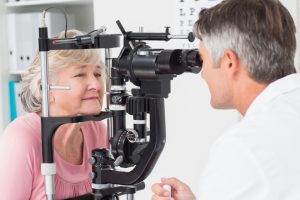 Vision loss may increase mortality risk in seniors. Researcher Sharon Christ said, “Participants who experienced visual decline of one letter on an eye chart were expected to have a 16 percent increase in mortality risk during the eight-year study because their vision affected daily activities. These daily activities were not the necessary functioning activities such as bathing, dressing, and eating, but rather instrumental daily activities, such as telephone use, shopping, and preparing their own meals. When individuals were no longer able to engage in these activities because of visual impairments, their life expectancy was reduced.”
Vision loss may increase mortality risk in seniors. Researcher Sharon Christ said, “Participants who experienced visual decline of one letter on an eye chart were expected to have a 16 percent increase in mortality risk during the eight-year study because their vision affected daily activities. These daily activities were not the necessary functioning activities such as bathing, dressing, and eating, but rather instrumental daily activities, such as telephone use, shopping, and preparing their own meals. When individuals were no longer able to engage in these activities because of visual impairments, their life expectancy was reduced.”
The researchers analyzed data from the Salisbury Eye Evaluation study, which tracked vision health of 2,520 older adults over the age of 65.
Advertisement
Christ explained, “What we found reinforces the value of visual care through the life course. Older individuals will benefit from early-detection services and as well as care to fix what are often correctable visual problems. A renewed focus on ocular health could save lives.”
Early detection and prevention of vision problems in elderly
Visiting an ophthalmologist regularly can help seniors catch any changes to their vision early on, so that medical intervention can take place to prevent a more serious condition. An eye doctor has the ability to look at the eye from front to back and spot any abnormalities. They can then offer solutions, be it lifestyle changes or medical treatments in order to maintain or restore vision.
The ability to see, especially in the senior years, is important for life longevity, as revealed by the recent findings. However, you don’t have to succumb to age and lose your vision. There are many things you try to ensure you do not fall a victim of age-related vision loss. Below are some effective tips on how you can maintain your vision right up into your 90s!
- Go for scheduled eye exams to detect any changes in vision early on.
- Ensure your vision prescriptions are up-to-date.
- Always wear sunglasses when venturing outside.
- Don’t look directly at the sun.
- Know your family history.
- Eat foods rich in eye-friendly nutrients – like dark leafy greens such as kale, and carrots.
- Maintain a healthy weight.
- Quit smoking.
- Ensure you are getting adequate sleep.
- Let your eyes rest, especially if you stare at a screen all day.
- Ensure you are wearing and cleaning contact lenses properly.
- Protect your eyes in workplace environments by wearing protective eye gear.
- Manage your diabetes, high blood pressure, and cholesterol.
Healthy lifestyle habits can help you maintain your vision for the long run without the threat of a shorter life.
